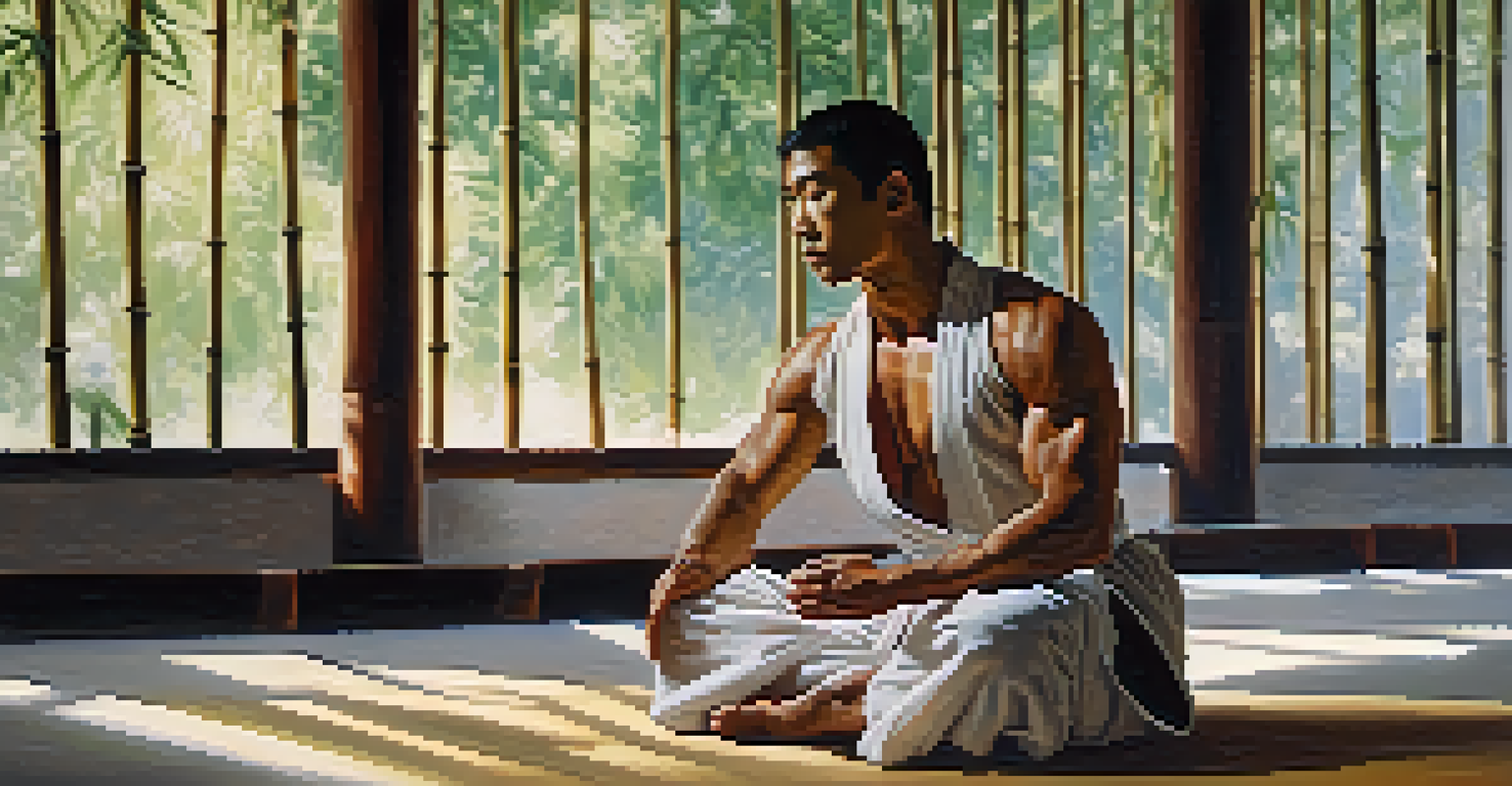Enhancing Focus in Martial Arts through Mindful Movement

Understanding Mindful Movement in Martial Arts
Mindful movement is the practice of being fully present and aware during physical activity. In martial arts, this means engaging not just your body, but also your mind in every punch, kick, or stance. Rather than going through the motions, practitioners focus on their breathing, form, and intention.
The mind is everything. What you think you become.
This heightened awareness can lead to improved performance, as it encourages a deeper connection between the mind and body. For instance, a martial artist who pays close attention to their foot placement can enhance their balance and agility. The result? More effective techniques and a smoother flow in their movements.
Moreover, mindful movement helps to cultivate a calm and focused mindset. By concentrating on the present moment, distractions fade away, allowing martial artists to channel their energy into their training. This practice not only boosts physical skills but also nurtures mental resilience.
The Role of Breath in Enhancing Focus
Breath is a powerful tool in martial arts and is central to mindful movement. By focusing on breathing techniques, practitioners can regulate their heart rate and calm their minds. For example, a simple deep-breathing exercise before a training session can set the stage for improved focus.

When breathing is controlled, stress levels decrease, allowing martial artists to perform at their best. In high-pressure situations, such as sparring, being able to breathe deeply can mean the difference between panic and clarity. This clarity enhances decision-making and reaction times during practice.
Mindful Movement Enhances Performance
Practicing mindful movement in martial arts improves physical skills by fostering a deeper connection between the mind and body.
Additionally, synchronized breathing with movement can create a sense of flow. For instance, exhaling during a strike can enhance power and precision. This rhythm not only improves technique but also deepens the connection between body and mind.
Visualization Techniques to Enhance Focus
Visualization is another effective strategy for enhancing focus in martial arts. By mentally rehearsing techniques and scenarios, practitioners can enhance their physical performance. Imagine a martial artist picturing themselves executing a flawless kick before stepping onto the mat.
To be present is to be free. Mindfulness is a way of befriending ourselves and our experience.
This mental imagery helps to reinforce muscle memory and build confidence. When martial artists visualize success, they are often more prepared to translate those images into reality. It's like practicing in your mind before taking action in the physical world.
Incorporating visualization into training sessions can lead to significant improvements. Regularly imagining successful moves can help athletes approach their practice with a positive mindset, making them more resilient to challenges.
Creating a Mindful Training Environment
The training environment plays a crucial role in fostering mindfulness. A calm, organized space can encourage focus, while distractions can pull practitioners away from their goals. For example, a dojo with minimal clutter and soothing colors can create a serene atmosphere for training.
Additionally, incorporating elements like soft music or natural sounds can enhance the experience. These auditory cues can help practitioners maintain their focus and mindfulness during training. Just like a peaceful setting can inspire creativity, a mindful environment can inspire better martial arts practice.
Breathing Techniques Boost Focus
Controlled breathing helps martial artists manage stress and maintain clarity during training and high-pressure situations.
Encouraging a culture of mindfulness among training partners also helps. Sharing techniques and experiences related to mindfulness can create a supportive community, further enhancing focus and commitment to personal growth.
Incorporating Mindfulness into Daily Routines
To truly enhance focus in martial arts, it's essential to incorporate mindfulness into daily routines. Simple practices such as morning meditation or mindful walking can set a positive tone for the day. Just a few minutes of focused breathing can create a sense of calm that carries through to training.
Practitioners can also apply mindfulness outside of martial arts by being present in everyday activities. Whether it's eating, exercising, or even having conversations, bringing awareness to these moments can improve overall focus. This practice transforms mundane tasks into opportunities for growth.
Over time, these habits build a foundation of mindfulness that enhances performance in martial arts. The more practitioners engage in mindful living, the easier it becomes to maintain focus during intense training sessions.
The Impact of Mindfulness on Performance
Research shows that mindfulness can significantly impact performance in sports, including martial arts. By reducing anxiety and enhancing focus, practitioners often see improvements in their techniques and outcomes. For instance, athletes who practice mindfulness are often more adept at handling competition stress.
Moreover, mindfulness fosters a growth mindset, encouraging martial artists to embrace challenges rather than shy away from them. This shift in perspective can lead to greater resilience and adaptability during training. It's like adding a new tool to an athlete's toolbox, enhancing their ability to navigate obstacles.
Visualization Builds Confidence
Using visualization techniques allows martial artists to mentally rehearse skills, reinforcing muscle memory and enhancing overall performance.
As practitioners experience the benefits of mindfulness, they may find themselves more engaged and passionate about their training. This newfound enthusiasm can lead to a virtuous cycle of improvement, as they become more committed to their practice.
Conclusion: Embracing Mindfulness in Martial Arts
Incorporating mindful movement into martial arts training offers a wealth of benefits, from enhanced focus to improved performance. By focusing on breath, visualization, and creating a supportive environment, martial artists can cultivate a deeper connection with their practice. These strategies not only enrich training but also promote overall well-being.
As practitioners embrace mindfulness, they unlock new levels of potential within themselves. The journey of martial arts becomes not only about mastering techniques but also about personal growth and self-discovery. Each training session becomes an opportunity to learn, adapt, and elevate one's skill.

Ultimately, the integration of mindfulness into martial arts can transform both the practice and the practitioner. By being present and engaged, martial artists can enhance their focus, leading to a more fulfilling and rewarding experience on and off the mat.